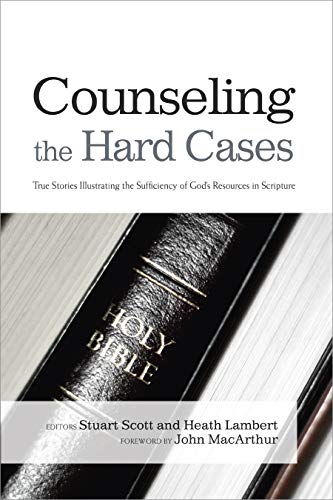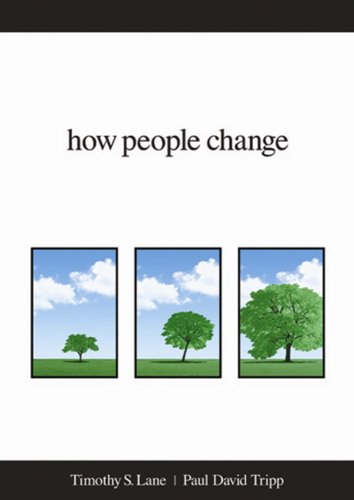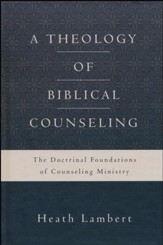Quotes about Counseling-Christian
Counseling Principles:
1. When seeking to bring about change, never attempt to do so in the abstract; people change only in concrete ways.
2. Always give hope. People will not persevere during the often-difficult process of change without hope.
3. Never minimize the severity of problems; instead always maximize Christ and His power to solve problems.
4. If a person has a life-dominating problem, aim at total restructuring.
5. Always approach the seemingly hopeless situations with emphatic disagreement. Empathy alone removes all possibility of help. Disagree when the counselee says, “It’s hopeless.” Say, “It is difficult, but not too difficult for God.”
6. Don’t become orientated toward people’s problems, but toward God’s solutions.
7. Gauge how much change is now feasible; too little is boring, too much is discouraging.
8. Don’t let people settle for less than the scriptural solution.
9. Use biblical, or biblically derived, language when analyzing and labeling problems, and when planning solutions to them.
10. Be command-oriented rather than feeling-oriented.
Preaching with a Purpose, Zondervan, 1982, p. 125-126. Get this book!
The counselor is perhaps better equipped for his task, if he has experienced personal difficulties, problems, doubts and fears, even a sense of guilt and failure, perplexity and distress, but has come through to peace, both spiritually and emotionally.
Encouragement – Oxygen for the Soul, Christian Focus, 1997, p. 71. Used by Permission.
Don’t just share your struggles, and above all, don’t just commiserate with one another. Remember, we are to be ministers of grace to each other. We are to seek to be avenues of the Holy Spirit to help the other person appropriate the grace of God. Praying with and for one another, sharing applicable portions of Scripture, and helping each other submit to God’s providential dealings with us, must characterize our times together.
Transforming Grace, NavPress, 1991, p. 193. Used by permission of NavPress – www.navpress.com. All rights reserved. Get this book!
God has defeated Satan through the death and resurrection of the Lord Jesus Christ. Through this overwhelming victory, God has also empowered you to overcome any temptation to sin and has provided sufficient resources for you to respond biblically to any problem of life. By relying on God’s power and being obedient to His Word, you can be an overcomer in any situation.
Self-Confrontation Manual, Lesson 21, Page 2, Used by Permission of the Biblical Counseling Foundation.
You can never truly understand or help others, even in your own family, unless you first look thoroughly into your own life and deal with your own sins without compromise, excuses, or evasion (Matthew 7:1-5).
Self-Confrontation Manual, Lesson 2, Page 7, Used by Permission of the Biblical Counseling Foundation.
When you willingly or unknowingly are under the control of any power other than God’s Holy Spirit (e.g., drugs, alcohol, sex, another person, your peer group, a false religion, a self-centered habit such as gossip or laziness, or a self-oriented desire for power, food, or wealth), you are in bondage to sin. However, God has broken the power of sin through the Lord Jesus Christ, and you can overcome sinful habits by depending on His strength and being obedient to His Word.
Self-Confrontation Manual, Lesson 20, Page 1, Used by Permission of the Biblical Counseling Foundation.
The process of biblical change, explained in God’s Word, begins when you repent of your sin and believe in the Lord Jesus Christ. God has given you everything you need to make the changes in your life that will please Him and will lead to His blessings. As you continue to obey God’s Word, biblical change toward maturity will occur in your life until you see Jesus face to face.
Self-Confrontation Manual, Lesson 2, Page 3, Used by Permission of the Biblical Counseling Foundation.
As you obey God’s Word and rely on His strengthening power, you can count on biblical change to occur in every area of your life.
Self-Confrontation Manual, Lesson 6, Page 1, Used by Permission of the Biblical Counseling Foundation.
Neglecting or refusing God’s ways brings multiplied problems. To deal effectively with your problems, you must realize your inadequacy and turn to the power of God for salvation. Then, you will be able to make the necessary biblical changes that characterize a child of God as you reverently depend on God and His Word.
Self-Confrontation Manual, Lesson 5, Page 1, Used by Permission of the Biblical Counseling Foundation.
Man’s “solutions” to your difficulties will ultimately fail because they do not deal with the source of your problems: your heart. God’s solutions, as revealed in Scripture, go to the heart of the matter where permanent change is accomplished.
Self-Confrontation Manual, Lesson 5, Page 4, Used by Permission of the Biblical Counseling Foundation.
The supreme challenge you will face in making Christ-honoring, biblical changes is dying to self. The biblical perspective concerning “self” is exactly opposite to what the wisdom of this world proclaims.
Self-Confrontation Manual, Lesson 9, Page 1, Used by Permission of the Biblical Counseling Foundation.
There are at least three potential authorities that influence a counselor’s approach: contemporary culture, previous experience, and scriptural knowledge.
Counseling the Hard Cases, Edited by Stuart Scott and Health Lambert, B&H Publishing, 2012, p. 229, Used by Permission.
Be patient. Is God not fast enough? Are His answers too tough? A quick sympathy from a friend may suggest that you simply drop out, be good to yourself, get away from it all. Someone else will be sure to say, “You need counsel.” Are you sure? One hour at the foot of the Cross may obviate the necessity of professional counseling (no such thing existed until the twentieth century – what did folks do before then?).
It is hypocritical to tell a counselee to trust God while you lean on your own skills, effort, and rehearsed Bible knowledge. Sometimes more Bible knowledge only beads up on a hard heart, and prayer is often the only way to furrow the soil so the Word can take root.
Counseling the Hard Cases, Edited by Stuart Scott and Health Lambert, B&H Publishing, 2012, p. 188, Used by Permission.
Our goal in counseling is threefold: 1. To get the counselee to see God’s character and compassion through the lens of Scripture; 2. To get the counselee to see himself and his problems as God does; 3. To get the counselee to feel God’s conviction and comfort as he peers intensely into the mirror of His Word.
Counseling the Hard Cases, Edited by Stuart Scott and Health Lambert, B&H Publishing, 2012, p. 183, Used by Permission.
A large part of good counseling is helping counselees see that at the root of all psychological problems are theological errors. No one can have a proper view of self without a proper view of God.
Counseling the Hard Cases, Edited by Stuart Scott and Health Lambert, B&H Publishing, 2012, p. 179, Used by Permission.
Church-based counseling is not consigned to the kind of finger-tapping approach that simply waits for the counselee to “come around.” Christ’s agenda for His people is much broader than that. Though much biblical counseling is reactive, we are not mainly to be responders but pursuers, like Jesus.
Counseling the Hard Cases, Edited by Stuart Scott and Health Lambert, B&H Publishing, 2012, p. 279, Used by Permission.
Most counseling problems reflect a distorted view of God and a deficient relationship with Christ.
Counseling the Hard Cases, Edited by Stuart Scott and Health Lambert, B&H Publishing, 2012, p. 260, Used by Permission.
The Scriptures teach…that persons have two constituent parts that exist in one unique whole; these constituent parts are called the “body” and “spirit” or the “inner person” and the “outer person.” The two elements may be distinguished but cannot ultimately be separated. Both are an essential aspect of a human being. Christians, therefore, should never discount either the spirit or the body. We do not counsel people to overcome their physical distress with some sort of “mind over matter” willpower. Instead, in harmony with Scripture, we take the body seriously. Scripture affirms that people need food (James 2:15-16), water (Rom. 12:20), and sleep (Eccl. 5:12). Paul affirmed the use of medicinal substances for the body (1 Tim. 5:23).
Counseling the Hard Cases, Edited by Stuart Scott and Health Lambert, B&H Publishing, 2012, p. 95-96, Used by Permission.
The carefully developed view of the biblical counseling movement is not that the Scriptures provide Christians with all of the information we desire but rather with the understanding we need to do counseling ministry.
Counseling the Hard Cases, Edited by Stuart Scott and Health Lambert, B&H Publishing, 2012, p. 14, Used by Permission.
I don’t know of any reason, from a biblical perspective, to distinguish counseling from discipleship. They are the same thing: helping other brothers and sisters in the church to follow Christ by embracing the Word of His gospel.
Though we are all Christians together, we are all different, and the problems and the difficulties, the perplexities and the trials that we are likely to meet are in a large measure determined by the difference of temperament and of type. We are all in the same fight, of course, as we share the same common salvation, and have the same common central need. But the manifestations of the trouble vary from case to case and from person to person. There is nothing more futile, when dealing with [a] condition, than to act on the assumption that all Christians are identical in every respect. They are not, and they are not even meant to be.
Spiritual Depression – Its Causes and its Cures, 1965, p. 15, Used by Permission from Elizabeth Catherwood (daughter). Get this book!
Those who experience the most suffering will receive the most comfort. And those who receive the most comfort are thereby most richly equipped to comfort others (see 2 Cor.1:3-4).
When godly people, armed with the confidence that God’s
Word is entirely sufficient, prayerfully and skillfully, gently but
firmly come alongside those who are confused, lost, hurting, or
otherwise struggling with some personal or spiritual dilemma,
the Lord is sovereignly disposed to use His Word through such
counsel in ways that please Him. His Word is the one thing
never returns void (Isaiah 55:11).
Counseling the Hard Cases, Edited by Stuart Scott and Health Lambert, B&H Publishing, 2012, p. xi, Used by Permission.
Let us be ruthless to root out theoretical structures that view people as psychological or socio-pyschological abstractions: the phenomena observed are not “ego defense mechanisms” but are pride’s offensive, defensive, and deceptive strategies. And let us also reject the therapeutic assumptions that are consequent to the theory: they are poor and deceptive substitutes for the Gospel of Jesus Christ.
Seeing With New Eyes, P&R Publishers, 2003, p. 198. Get this book!
Always, always, always, when providing Christian counseling or sharing the Gospel – give hope! There is absolutely no sin that a believer cannot overcome in Christ. And there is no degree of sin that God cannot forgive if someone embraces Christ for salvation.
Do not open your heart to every man, but discuss your affairs with one who is wise and who fears God.
You are most loving patient, kind and gracious when you are aware that there is no truth that you could give to another that you don’t desperately need yourself. You are most humble and gentle when you think that the person you are ministering to is more like you than unlike you. When you have inserted yourself into another category that tends to make you think you have arrived, it is very easy to be judgmental and impatient.
Headed for Disaster by Paul David Tripp taken from Dangerous Calling by Paul David Tripp copyright 2012, Crossway Books, a division of Good News Publishers, Wheaton Illinois 60187, www.crosswaybooks.org, p. 23-24.
“The purpose in a man’s heart is like deep water, but a man of understanding will draw it out” (Pr. 20:5). The goals and motivations of the human heart are not easily discovered. The patience, skill, and ability of an understanding person are required to draw out those deep waters.
The would-be counselor should have some basic knowledge of human psychology, normal and abnormal. He must be a good listener, slow to interrupt, until he feels sure that he has something worthwhile to contribute, some helpful question to ask. The counselor should be genuinely humble and receptive, with an objective approach to the problem under discussion, and he should avoid all well worn clichés, truisms and easy slick solutions. He is not there to sermonize or to moralize – certainly not till he has heard all that the enquirer has to say, and he must avoid a holier-than-thou attitude. Further, he should not show shocked surprise, disapproval or condemnation.
Quoted by Derick Bingham, Encouragement – Oxygen for the Soul, Christian Focus, 1997, p. 70. Used by Permission.
While biblical counselors should place appropriate attention on matters of the body, the central focus must always be the heart. The good news is that God is powerful to help His children change in their innermost being. Teaching shallow behaviorism is fruitless and unnecessary because God’s Word teaches that God’s power is effective at the deepest levels of who we are.
Counseling the Hard Cases, Edited by Stuart Scott and Health Lambert, B&H Publishing, 2012, p. 83, Used by Permission.
Biblical counseling presents not just biblical content but biblical compassion. We are not just offering scriptural truth but scriptural tenderness.
Counseling the Hard Cases, Edited by Stuart Scott and Health Lambert, B&H Publishing, 2012, p. 67, Used by Permission.
Many Christians are spiritually stunted because they are trying to fulfill…the gospel imperatives without soaking themselves in the foundational truths regarding their identity…the gospel indicatives. Counselors must also avoid falling into either side of this ditch. On one side counselors must not focus on good behaviors while excluding the gospel indicatives that empower those behaviors. On the other side counselors must consistently explain how the heavenly realities of who we are in Christ translate into real-life actions.
Counseling the Hard Cases, Edited by Stuart Scott and Health Lambert, B&H Publishing, 2012, p. 78, Used by Permission.
A biblical approach to change focuses on someone other than ourselves. Change starts, proceeds, and ends with Jesus. We look to Jesus and away from ourselves.
Addictions – A Banquet in the Grave, P&R Publishing, 2001, p. 142, Used by Permission. Get this book!
The heart and mind are complex and difficult to understand, and the symptoms of an unwell heart are wildly diverse. Counselors have a daunting task: They seek to understand aching and fractured, angry and despairing people, and try to offer help. This is impossible, or course, without prayerful, Spirit-endowed compassion along with a careful, attentive, empathetic investigation into each counselee’s history.
Counseling the Hard Cases, Edited by Stuart Scott and Health Lambert, B&H Publishing, 2012, p. 113, Used by Permission.
It can be easy for some counselors to treat the Bible like Tylenol, but Scripture was never intended to be prescribed for mechanical ingestion every six hours to make people feel better… Counselors who prescribe Scripture are in danger of approaching their counselees in a routine, uninterested, and dispassionate way. They instruct counselees to memorize this verse and to write out that verse, but they don’t use the powerful Word as a dynamic means to encounter the living Christ. They rarely delve into the depth of biblical passages, the character of God, the beautiful implications of the gospel, or the nature of the sinful heart that fuels idolatry and deception. It is spiritual malpractice.
Counseling the Hard Cases, Edited by Stuart Scott and Health Lambert, B&H Publishing, 2012, p. 118, Used by Permission.
Recommended Books
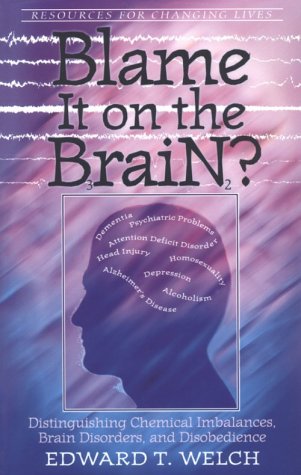
Blame It on the Brain: Distinguishing Chemical Imbalances, Brain Disorders, and Disobedience
Edward Welch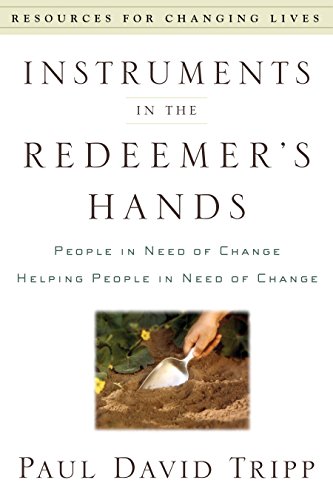
Instruments in the Redeemer’s Hands: People in Need of Change Helping People in Need of Change
Paul David Tripp